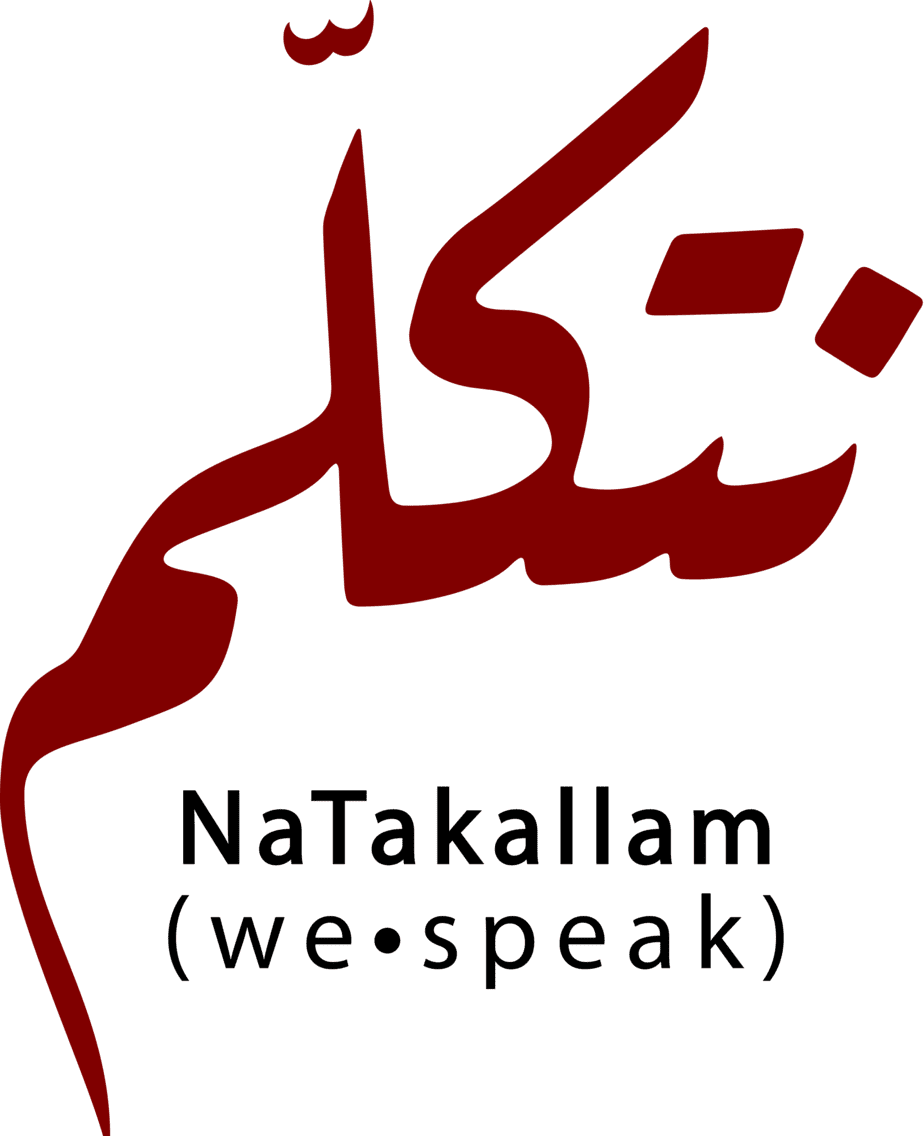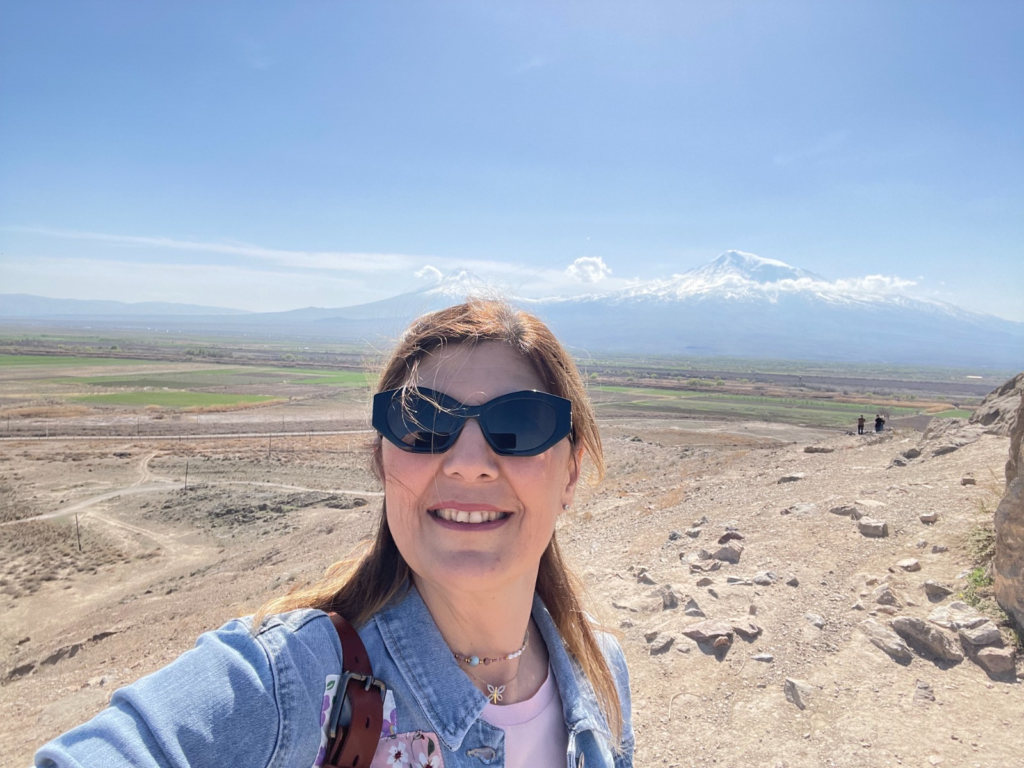The Language of Survival: Ani’s Story of Culture, Connection, and Coming Home
Anahid — or Ani, as she likes to be called — is a Lebanese-Armenian Language Partner at NaTakallam, teaching Armenian to students all over the world. Seeking refuge has shaped her family history, starting with her grandparents, who fled the Armenian Genocide in 1915 and rebuilt their lives in Lebanon, where Ani herself was born and raised.
In 2020, facing growing instability in Lebanon, Ani decided to return to Armenia — her ancestral homeland. What started as a temporary trip turned into a new beginning, one that eventually brought her to NaTakallam. Today, we’re sharing Ani’s story of resilience and re-start — and how language and culture have enabled her to preserve the essence of Armenia long before she could call it home again.
"Language is at the core of any culture. It plays a great role in preserving the identity – influencing music, poetry, literature and all of the arts. Language is the main tool that struggles against assimilation.” - Anahid Dakessian
An Armenian Story of Resilience
Anahid’s name carries meaning: inspired by the Armenian goddess of fertility, healing, and wisdom. Born and raised in Beirut, Lebanon, those qualities — healing and rebirth — were deeply woven into the Armenian community around her. A community that had survived genocide and was committed to preserving a culture that had almost been erased.
They appeared in the smallest, everyday things. Her grandparents, originally from Adana (modern-day Turkey), only spoke Armenian to their children — even if someone in the community spoke in Turkish, their reply would always be in Armenian. Her parents, both born in Lebanon, learned the language of their hosts but never strayed from speaking Armenian at home.
Ani grew up in this tight-knit world: Armenian schools, churches, theaters, scouting associations, charity and healthcare centers — all within Lebanon. In the early 1930s, Armenians in Lebanon had began building Armenian institutions and organize a community life. Armenian became the main language of expression in schools. Turkish and Kurdish were banned from homes.
“It was amazing to witness that we had the freedom of religious expression and could maintain our culture, far away from home,” she recalls.
Despite Lebanon being her birthplace, Ani always considered Armenia her sacred homeland — a feeling shared by many Armenians born in the diaspora. Language, for her, was more than just communication; it was survival. Whenever new words entered global vocabulary, especially around technology, the Armenian community would always seek the proper Armenian term rather than mixing in English or French, as is common in Lebanon.
Eventually, Ani made it her mission to teach her language at an Armenian school in Beirut, instilling in a new generation of a community that makes up 4% of Lebanon’s population the significance and importance in honoring their identity. Her job as a teacher even gave her the chance to visit Armenia on school trips with her students, deepening her sense of connection to the homeland she loved.
Returning Home and Finding NaTakallam
“It was only supposed to be a 15-day trip to Armenia for summer, to visit my two sons who were studying at Yerevan’s Conservatory,” Ani remembers.
But 2020 had different plans. Lebanon’s worsening economic crisis and the devastating Beirut port explosion destroyed the lives and futures of many — Ani’s included. What began as a short visit turned into a permanent move.
For Ani the decision to start over wasn’t easy, but it was necessary. At first, she continued teaching remotely at her school in Lebanon, like many educators during the pandemic. With time, she started teaching at a local Armenian school. Her new job offered her both stability and purpose, though it also came with new challenges. For the first time, she was fully immersed in Eastern Armenian — the dialect spoken in Armenia — rather than the Western Armenian she had grown up with in Lebanon.
Even though she was fluent in both dialects, she grew up with the Western Armenian dialect – living and speaking Eastern Armenian daily was something new. “Conjugation is different from Western Armenian, but the root is the same: for example, Armenians in Lebanon say geh seerem (I love), while in Armenia people say seeroom em. It’s basically like the difference between Egyptian and Lebanese Arabic,” she explains.
Discover The Nuance of Eastern & Western Armenian Dialects with a NaTakallam Language Partner.
She also noticed how the Armenian spoken in Armenia often borrowed Russian words, reflecting the country’s Soviet past — another cultural layer to adapt to. But despite the challenges, Ani felt at peace. And after her first year, she had fully embraced her new life. She felt like she had reached home.
This is also when NaTakallam entered the picture.
“Online teaching had become more normal during COVID, and I was intrigued by the chance to continue pursuing my dream job, teaching, with new tools,” she says.
For the first time, she found herself teaching Armenian to non-Armenians from all over the world, as well as helping members of the diaspora reconnect with their heritage. One of her most touching memories is of a 70-year-old Armenian-American woman who, after a lifetime of not speaking the language, wanted to finally learn and reconnect with her roots — with Ani’s help.
Through NaTakallam, Ani realized the beauty of making Armenian accessible to anyone, anywhere.
And to anyone interested in learning, she always offers the same advice: “No better way to experience the language and culture than to visit Armenia.”
Home is Where Your Family Is
When asked if she would ever return to Lebanon — the place where she grew up, spent most of her life, and still has friends and connections — Ani’s answer is clear.
“You know, I will always love visiting Lebanon, and I do it regularly. But to me, the feeling of home is very simple: home is where I live, where the people I love are.”
She shares an Armenian reference to explain what she means: in Armenian, Danik means “roof” or shelter, while Endanik means “family.” The words sound almost the same — because, to Ani, family is the roof over your head. It’s what makes a place feel like home.
For the past five years, she and her husband have lived in Yerevan, close to one of their sons who is now married and settled there. Her younger son lives in London, and Ani hopes that one day, they will all be reunited under the same “roof.”
A woman of culture, resilience, and reinvention — Ani embodies the Armenian spirit. Like the nation she belongs to, she stands tall in the face of hardship, always holding onto her roots and her identity.
And it’s no surprise that a common Armenian saying is: “Our spirit is unbreakable and our will is unwavering.”
Want to immerse yourself in Armenian culture and language from native speakers like Anahid? Book a session with one of NaTakallam’s expert tutors and connect with a community that brings language and culture to life.
ABOUT THE AUTHOR: Zeina Abou Taha is an intern at NaTakallam, currently transitioning from a career in IT consulting into journalism. With an academic background in Entrepreneurship & Innovation and a passion about exploring the world, Zeina spends her free time traveling, connecting with people from diverse cultures, and writing for her personal blog.
The Language of Survival: Ani’s Story of Culture, Connection, and Coming Home Read More »




